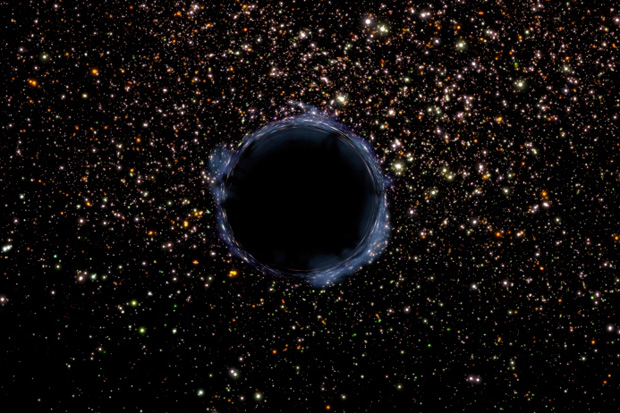The idea of black holes sounds so quintessentially modern and 20th-century that it may come as a surprise to learn that it originated over 200 years ago; John Michell, a natural philosopher and clergyman, used Newtonian physics to conceive of a star massive enough to prevent even light from escaping its gravitational pull.
Marcia Bartusiak’s lively and readable account of the history of black holes kicks off with an account of Michell’s 1784 paper. There’s a lull in the story after that, because a proper formulation of the physics had to wait until Einstein’s general theory of relativity in 1915. This date is significant; it’s the 100th anniversary of this theory in November, and Bartusiak is clear that the purpose of her book is to celebrate the theory’s most famous prediction. It should be said that there are many other popular accounts of general relativity, in particular Pedro Ferreira’s recent The Perfect Theory, which cover this material in greater depth.
However, Bartusiak’s stated aim is not to explain the detailed science (which is just as well, given the brevity of the book and the infamously complex mathematics involved), but to convey what she calls ‘the history of an idea’. The book succeeds best when she shows us how physicists repeatedly backed away from their own predictions of the theoretical possibility of black holes. Nowadays we may be fascinated by them, but to many scientists (and even Einstein himself), the idea was simply a monstrosity which Nature would somehow find a way to avoid.
Their problem was that a black hole was predicted to form when a massive star collapsed into a singularity; a point in space-time with infinite mass. The key sticking point was whether this singularity was physically real or simply an artefact of the convoluted maths. Astronomers and physicists argued this point for decades, even as the detailed physics of stellar evolution was worked out and they were coaxed inexorably to the truth through successful predictions of denser and denser objects such as white dwarfs and neutron stars — stepping-stones to the singularity.
Bartusiak is clear that it was the discovery of quasars in 1963 which provided the tipping point in the scientific community. Curiously, she makes far less of the 1967 discovery of pulsars, which is only mentioned in passing. But the existence of pulsars — rotating neutron stars which beam radio waves through space — was a game-changer. Such clear, uncontested evidence of this predicted state of matter was correctly interpreted at the time as supporting the existence of black holes themselves.
Bartusiak’s ambition works best when she demonstrates the all-important shift in attitudes during the 1960s, when physicists stopped thinking of black holes as simply the end point of dying stars and started to consider them as interesting in their own right, leading to fruitful explorations of their bizarrely limited properties and the prediction that a black hole only has three observables: mass, electric charge and spin. So started a renaissance in general relativity studies which, with little experimental work to drive it until then, had been languishing in the doldrums for decades and was shunned by many physicists.
A key aspect to this renaissance was work by Hawking and Penrose showing that, in the Big Bang model, the origin and expansion of the whole universe must invariably start with a singularity. It’s a shame that Bartusiak misses the opportunity to explain how black hole studies influenced this crucial and productive development in cosmology. In her aim to detail the ‘history of the idea of black holes’, this gap must be considered a failure of the book.
She does, however, briefly cover another important application of black holes; the link that they make between the two fundamentally different theories of general relativity and quantum physics. Hawking’s elegant work on quantum radiation emitted by black holes gives the first real hope that the theories can yet be properly unified.
Don’t read this book in search of a detailed account of the relevant physics, but do read it if you want to know how the concept of black holes has changed dramatically over the past 100 years — from being an apparent mistake in the maths to the strangest and most outlandish objects that we (currently) know of.






Comments